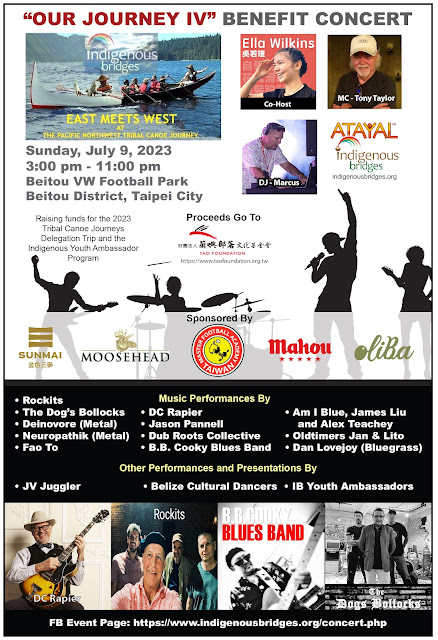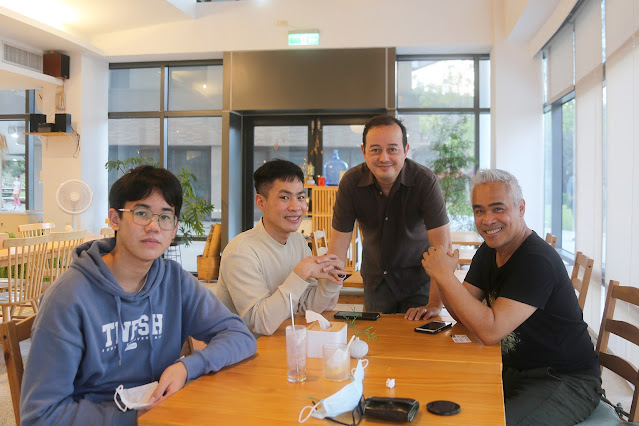Annual Report 2020
The year of 2020 was one of big changes for the world and for our organization as well. Large gatherings of people and international travel became banned and online meetings became the norm. The cultural exchange activities of the ATAYAL organization were suspended, including our most important cultural exchange event, the Tribal Canoe Journeys.
Instead of hanging up our paddles, our organization used the down time to be productive, strengthening the foundation for a sustainable future. We worked on the four pillars of our foundation: Recruiting, Program Development, Partnerships and Fundraising.
I. RECRUITING
In 2020, we added key members to our Board, International Advisory Board, and to our Staff. Each person offers the organization their experience, skills and connections. More importantly, they bring a passion and respect for the indigenous people and their cultures.
Dr. Ming-lon Young - Chairman of the Board
Guy Charlton - Board Member
Michael Sidebotham - International Advisory Board Member
Mark Sussman - International Advisory Board Member
Dr. Yae-wei Wang - International Advisory Board Member
Chloe Hsia - PR Coordinator
Anthonie Tumpag - Director of Digital Media
Jiun-yu Liu - Project Coordinator
Will Tsang - Project Coordinator
Our team is growing, and we need more talented, committed people to develop, execute and nurture the programs for future generations of indigenous youth. Check out our Organizational Chart to see what staff positions are filled and which are open. There are also volunteer positions open for our Programs.
If you are interested in volunteering, visit our Volunteer Page on our web site.
Click here to read the Roles and Responsibilities of our Staff, International Advisory Board Members, and Board Members.
II. PROGRAM DEVELOPMENT
1) Vision and Purpose
Our Vision is that indigenous communities around the world become connected in meaningful ways. We foresee a Network of Sister Tribes or Sister Villages bringing people together. This connection allows tribes to develop activities and programs with each other, to grow stronger together, to overcome shared challenges through cooperation. The bonds that bridge the divide are the bonds of indigenous culture, and with these bonds, they can develop many types of opportunities, including education, tourism and trade. With the indigenous culture, language and traditional wisdom being shared, the preservation of these irreplaceable aspects of indigenous identity can become a priority.
Our organization's Indigenous Bridges Programs are being developed to create "bridges" between the Sister Tribes and Villages. But, who will lead these tribes towards their proud, connected futures? That is where our flagship program comes in. As mandated by Hanford McCloud, our Board Member, and Nisqually Tribal Council Member, we shaped our main programs to serve the indigenous youth.
2) Indigenous Youth Ambassadors Program (IYAP)
The Indigenous Youth Ambassadors Program (IYAP) brings together future indigenous leaders, to share their indigenous cultures with pride, form bonds with representatives of other tribes, and learn to cooperate to create solutions for shared problems faced by all indigenous communities. This programs nurtures international leadership qualities and grooms the young ambassadors to be the future caretakers of the Sister Tribes network.
The Indigenous Youth Ambassadors Program (IYAP) facilitates indigenous youth taking part in international cultural exchange activities, such as the Tribal Canoe Journeys in Washington State, USA. Hanford McCloud has invited a Taiwanese indigenous delegation to join his Canoe family for several years as part of the Tribal Canoe Journeys. We are also developing cultural exchange opportunities for Native Americans visiting Taiwan.
2a) Virtual Indigenous Culture Exchange and Conference
With the Tribal Canoe Journeys suspended indefinitely, the organization has developed an online indigenous cultural exchange activity for the Indigenous Youth Ambassadors Program. A cornerstone of the IYAP program will be an annual Virtual Indigenous Culture Exchange and Conference. Click here to see more details about this upcoming virtual event. Our Director of Digital Media, Anthonie Tumpag assisted us with the development of this virtual event.
We're proud to have our first Indigenous Youth Ambassador delegate from the Saisiyat Tribe of Taiwan. Corayne of the Saisiyat Tribe will receive a scholarship award to participate in the development and participation in our virtual culture exchange activities during the 2021 Virtual Indigenous Culture Exchange and Conference. You can donate to Corayne's scholarship fund.
3) Tatala Canoe Building and Paddle Around Taiwan
In 2020, Deputy Director Gary Smoke attended a press event for the traditional Tatala (canoe) builder named Akai from the Tao Tribe. The purpose was to show support and further develop the relationship. Akai plans to paddle his Tatala around the entire island of Taiwan in different stages, and we hope this can develop into a future international indigenous cultural exchange event in Taiwan, attracting canoes and sailing vessels from tribes around the world.
4) Indigenous Tourism
In 2020, Deputy Director Gary Smoke attended conferences and events related to promoting Indigenous Tourism in Taiwan. Executive Director Tony Coolidge joined a special tour to the Alishan area in Chiayi County that was designed to highlight Taiwan's indigenous Tourism. He joined Minister Lin Chia-lung (林佳龍) of the Ministry of Transportation and Communications and Chang Shi-chung (張錫聰), Director General of the Tourism Bureau, MOTC on the trip. We continue to learn from these opportunities and build connections, in order to incorporate the promotion of indigenous tourism into its international indigenous culture exchanges.
III. PARTNERSHIPS
In 2020, we have increased discussions and activities with key partners to strengthen our partnerships and to benefit the communities that we serve.
1) Taiwan Economic and Cultural Office in Seattle (TECO)
In 2020, we had increased cooperation with TECO Seattle, strengthening our relationship with the representative office. Through Vice Consul Tony Hu, we coordinated with two Director Generals in 2020, including Director General Alex K.S. Fan and Director General Daniel Kuo-Ching Chen.
On July 8, 2020, we facilitated the donation of medical face masks to the Nisqually Tribe and the Lummi Tribe of Washington State provided by the government of Taiwan as part of the We Can Help program. Aside from the mask donation, the tribes had discussion with TECO Seattle about future cooperation and activities with Taiwan.
In the late Fall of 2020, Director General Daniel Kuo-Ching Chen announced that the Taiwanese Chamber of Commerce in Seattle wanted to donate 5,000 Taiwanese face masks to the ATAYAL organization.
2) Council of Indigenous Peoples (CIP)
In 2020, the ATAYAL organization resumed direct talks with the Council of Indigenous Peoples, a Ministry of the Taiwan's government serving the indigenous people. Members of our organization had a meeting in the CIP offices in Taipei to discuss our programs and funding needs. The CIP offered their support and announced that they were allowed to fund foreign NGO's directly for international cultural exchange projects involving Taiwan's indigenous peoples. We are currently working on our first grant proposal regarding the 2021 Virtual Indigenous Culture Exchange and Conference.
3) Center for Aboriginal Studies, National Chengchi University
On October 27, 2020, Tony Coolidge and Gary Smoke met with Professor Yae-wei Wang, our newly added International Advisory Board member to prepare for the meeting with the Center for Aboriginal Studies at NCCU. This organization was hired by the CIP to help connect our organization with Taiwanese NGO's for cooperation. Our goal was to sign an MOU with an NGO in Taiwan that worked on indigenous exchanges.
IV. FUNDRAISING
In 2020, we had a very low fundraising results, as the activities came to a halt, and most donors focused on provided PPEs to healthcare workers and vulnerable communities. We also put fundraising activities aside to focus on program and partnership development. According to our 2020 Financial Report, we did raise USD $2,381 from eleven donations.
In the Fall of 2020, our organization submitted a Grant Proposal to the Nisqually Community Foundation and was awarded a grant of USD $10,000 to cover a future exchange trip for a Nisqually delegation to Taiwan. We received the funds in January 2021.
Our current fundraising campaign raises scholarship money and funding for our Indigenous Youth Ambassador Program (IYAP).
V. ANNUAL MEETING
On November 21, 2020, we held an Annual Meeting in the English Library in Taipei, our informal headquarters in Taiwan. A video of the meeting can be seen here. On January 18, 2021, we held a Reconvened Annual Meeting, because COVID-19 prevented the Board Members to gather in person. In the Reconvened Annual Meeting, we conducted our annual business and voted on items as defined by our Bylaws.







Comments
Post a Comment